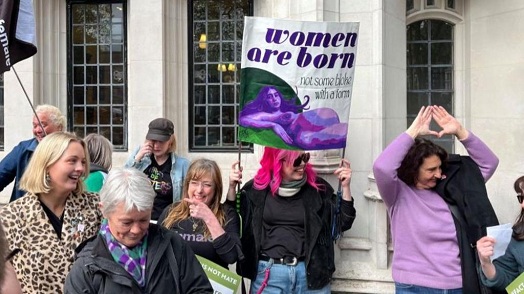Britain’s highest court ruled Wednesday that the legal definition of a woman is based on biological sex.
“The unanimous decision of this court is that the terms woman and sex in the Equality Act 2010 refer to a biological woman and biological sex,” Patrick Hodge, deputy president of the Supreme Court, said as he delivered his judgment on Wednesday.
It will be seen as a landmark victory for gender-critical feminist campaigners who have long argued biological sex is immutable, and a blow for transgender rights activists. The ruling could have far-reaching implications for the provision of single-sex spaces and other gender-specific public services across Scotland, England and Wales.
The long-running legal challenge was brought by the For Women Scotland campaign group — who argue sex is biological, binary and can’t be changed — against the Scottish government.
The case dates back to 2018 when the Scottish administration, led by then-First Minister Nicola Sturgeon, passed legislation to establish gender quotas to get more women serving on public boards.
It was eventually amended to count trans women with gender recognition certificates, confirming their female gender, as women for the purposes of the legislation.
Scottish courts ruled, and then upheld in the Scottish government’s favor, that sex is “not limited to biological or birth sex,” and must include those in possession of a gender recognition certificate (GRC).
But that was challenged in London’s Supreme Court by campaigners. And, in its ruling Wednesday, the country’s highest court said the meaning of the terms “sex,” “man” and “woman” in the U.K.’s Equality Act must refer to “biological sex” — with any other interpretation deemed “incoherent and impracticable.”
The summary of the court ruling read: “Therefore, a person with a Gender Recognition Certificate in the female gender does not come within the definition of a ‘woman’ under the Equality Act 2010 and the statutory guidance issued by the Scottish ministers is incorrect.”
Trans rights campaigners had warned that if the court deemed a Gender Recognition Certificate insufficient to change one’s sex in the eyes of the Equality Act, then transgender people would lose protections they have against discrimination.
Hodge stressed that the ruling should not be seen as the triumph of one group over another, and pointed out that the Equality Act still gives protection to transgender people “not only against discrimination through the protected characteristic of gender reassignment, but also against direct discrimination, indirect discrimination and harassment in substance in their acquired gender.”
--Politico--





